Hey kids, impress your friends with these dandy new vocabulary words, bits of classic 1950s and 1960s lingo and regional expressions that you may not have heard in a long time . . . if ever! These words and phrases were really swell in the 1950s and ’60s; you can wow your teachers, parents, grandparents, maybe even your great-grandparents, by making their old slang new again! Just click on the + symbol to learn a term’s description, and soon you’ll be talking like a Happy Hollister!
Note for parents and teachers: Some words used in The Happy Hollisters series have fallen out of use in American speech, often reflecting historical and societal changes over the years. We chose to retain them in the reissues for an accurate depiction of the time period in which the books were originally written. We hope that these vocabulary words may lead to valuable “teaching moments” and lively family discussions of American history and changes in the English language.
Sometimes March comes in like a lion and goes out like a lamb—to tell the difference you could use an anemometer, an instrument for measuring windspeed.
Can you picture that imp, Ricky Hollister, attaching an ironing board to the back of a speed boat, just for kicks? An article about the history of waterskiing and wakeboarding by Lawrence P. Gooley included this description of aquaplaning, and it sounds like it was written with Ricky in mind: “. . . participants attempted to ride a toboggan or an ironing-board-shaped plank, usually about five feet long and two feet wide, towed behind a boat. The boards often resembled the average house door.” Enjoy the whole article at: http://www.adirondackalmanack.com/2012/07/history-before-water-skiing-there-was-aquaplaning.html#sthash.Jqskhiti.dpuf
The happy and kind-hearted Hollister girls wanted to make a new coat for their burro, Domingo, who wasn’t accustomed to Shoreham’s frigid winter climate. Mrs. Hollister suggested they use an old automobile robe from a trunk in the attic. Also called a lap robe, this was a heavy blanket used to keep passengers warm in open sleighs and unheated automobiles. Once the girls were finished cutting and sewing, it made a dandy new coat for Domingo!
The villainous Mr. Bushyface says the Hollisters are balmy, or crazy, because of the wild accusations they’ve made against him. But balmy can also mean pleasant, as in balmy weather. Two very different meanings—that’s just balmy!
When the Hollister children put on a puppet show to raise money to send underprivileged children to summer camp, Ricky offers to be the barker for the show. Can you picture mischievous Ricky barking like a dog to attract attention? A barker stands in front of a circus sideshow or a theater marquee and calls out (barks) to attract passersby to attend the show.
Scowbanger, a friend of the Happy Hollisters, has an old automobile (that’s another word for car, kids!) whose fenders and roof had been removed, and it had enormous balloon tires. Historically, cars and boats often get girl names, and Scowbanger’s beach buggy is called Jenny Jump because she can leap over sandy gullies like a frog! A beach buggy is sometimes called a dune buggy.
When Farmer Hill offers Pete and Pam a glass of warm milk that he “just got from Bossy,” he doesn’t mean he got it from his overbearing wife. “Bossy” was a generic cow nickname back in the day when owning livestock was more common, just like “Fido” is sometimes used for dogs today. Cats were called “Tabby,” and “Dobbin” was a horse. And in case you’re wondering, Farmer Hill wasn’t offering to heat that milk up in the microwave – it was already warm because it came straight out of Bossy. Yum!
“Holly, hopeful at once, jumped up and down and clapped as Uncle Russ took the telephone and called long-distance.” If you remember when making a long-distance call was a BIG DEAL, you might be of a certain age! Here’s a “simple” explanation of how long-distance calling works, thanks to the folks at How Stuff Works: http://electronics.howstuffworks.com/question354.htm
Old-fashioned merry-go-rounds didn’t use recorded music like they do today. Instead, the music came from a band organ or calliope, a musical instrument with a keyboard that controlled about 30 steam whistles. A calliope has a very distinctive (and loud) sound, most commonly associated with circus music. The word means “beautiful voice” and can be pronounced kə-LYE-ə-pee or KAL-ee-ohp. Here is a website with some nice sample music, if you’d like to hear what a calliope sounds like: http://music.carouselstores.com/
Before cell phones made it easier to phone a friend—or to call for help in an emergency—police call boxes were a much more familiar sight, especially in larger locales like Skyscraper City. These special telephones were located in metal boxes at the sides of the road and were typically reserved for emergencies and police use.
You’d think the Hollisters, living in quaint, suburban Shoreham, would have had a finished basement with carpeting, swag lights and a pool table, but Pete says they have a cellar, and he knows best. But a cellar is typically an underground storage area with dirt walls used to store fruit and vegetables, and it isn’t always directly beneath a house. The cellar is where Dorothy was headed in The Wizard of Oz, when she’s trying to pull open those big, heavy doors in the ground to escape the cyclone.
Pete has many friends in Shoreham, but his closest chum is Dave Mead, who often joins him for fishing and boating on pine lake. “Chum” is a slang term for a good friend. It can also refer to fishing bait made out of chopped-up pieces of other fish, so while on a fishing trip with Dave, Pete could both use chum and hang out with his good chum!
After a chilly walk to Lincoln School, the Hollisters need somewhere to put their winter coats, boots, and caps before rehearsing their Christmas play. The school’s cloakroom, a large storage room lined with hooks and cubbies, is the perfect place for them to stow their things.
Pete Hollister sets up a camera to record a photo of a prowler, but White Nose the cat trips the shutter instead. The children are excited to enter a fishing contest, but their boat is stolen. The Happy Hollisters are sometimes disappointed—or crestfallen—when they are foiled in their adventures, but they always find a way to see the bright side of things.
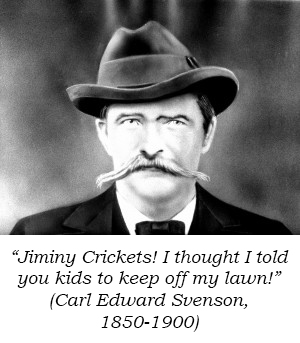 Pete uses this as an exclamation of distressed surprise. Everyone thinks Pete is such a polite, clean-cut kid, but it turns out “crickets!” is actually pretty darn close to swearing! (Say it ain’t so, Pete!) “Crickets!” may be a shortened and cleaned-up form of “Jiminy Crickets!” a minced oath or euphemism for a two-word curse with the same initial letters. Jerry West was clearly up on his contemporary pop culture: the character “Jiminy Cricket” is familiar from Disney’s Pinocchio, and the phrase is also used by Dorothy in The Wizard of Oz, when she is startled by the thunder and lightning inside the wizard’s chamber. It also was used in the 1930 film, Anna Christie, starring Greta Garbo. Her character’s Swedish father (see where I’m going with this?) uses the same exclamation several times. Maybe Jerry West, aka Andrew Svenson, heard the expression from his Swedish father, Sven Andrew Svenson, or from his even more Swedish grandfather, Carl Edward Svenson.
Pete uses this as an exclamation of distressed surprise. Everyone thinks Pete is such a polite, clean-cut kid, but it turns out “crickets!” is actually pretty darn close to swearing! (Say it ain’t so, Pete!) “Crickets!” may be a shortened and cleaned-up form of “Jiminy Crickets!” a minced oath or euphemism for a two-word curse with the same initial letters. Jerry West was clearly up on his contemporary pop culture: the character “Jiminy Cricket” is familiar from Disney’s Pinocchio, and the phrase is also used by Dorothy in The Wizard of Oz, when she is startled by the thunder and lightning inside the wizard’s chamber. It also was used in the 1930 film, Anna Christie, starring Greta Garbo. Her character’s Swedish father (see where I’m going with this?) uses the same exclamation several times. Maybe Jerry West, aka Andrew Svenson, heard the expression from his Swedish father, Sven Andrew Svenson, or from his even more Swedish grandfather, Carl Edward Svenson.
Throughout the books, Pete Hollister sports a crew-cut. Also sometimes spelled as crewcut, this is a hairstyle with hair trimmed close to the head. The style has been around since the 18th century and is particularly associated with athletes and military members who like a neat, handsome, no-frills haircut.
One of those squeaky-clean adjectives meaning “mighty fine” that the Hollisters are so fond of! See also keen and swell.
The dinette of the Sweetie Pie, Uncle Russ’s boat, was an eating area that was magically converted to a big double bed.
This is a person who leads a marching band, usually carrying a baton. Just like a drum major, except a drum majorette is a girl.
In 1953, girls wore dresses or skirts most of the time, but a nice little girl would not clamber onto a merry-go-round wearing a dress. For special occasions, like a picnic in the State Park, she might be allowed to wear dungarees – heavy blue fabric fashioned into pants or overalls. You probably own a pair of blue jeans; pretty much the same thing.
In the Happy Hollisters’ day, packages were usually delivered by an employee of the company or firm where they originated, not by a 3rd party delivery service. For example, Tinker might personally deliver an order from the Trading Post directly to a customer. Expressmen were more like UPS or FedEx drivers, delivering packages from a variety of establishments.
“First-rate detecting” implied that the Happy Hollisters were doing a good job tracking down Old Moe. The original meaning of first-rate, however, doesn’t necessarily mean good. It referred to the number of men or cannons on a naval ship; the more men or cannons, the higher the rating, so first-rate is better than second-rate.
You might call them pancakes, griddlecakes, or hotcakes. Many of the Hollisters/Svensons actually prefer waffles.
Not so very long ago, before digital cameras with automatic flashes, there were instant film cameras, also known as Polaroids, and they were the cat’s pajamas. (See dandy, keen and swell.) Since Mr. Hollister was an inventor, he probably enjoyed having all the latest high-tech gadgets. These fancy cameras had special photo paper inside that developed right inside the actual camera, without darkroom processing, negatives, printing and all that. The flashbulb was single-use and looked just like a very small light bulb.
A frankfurter is a sausage made of beef or pork, originally made in the city of Frankfurt, Germany. You could say it’s the same thing as a hotdog, but Mrs. Hollister did not simply pick up a package of hotdogs at the grocery store. She would have made a special trip to the butcher. There she would have purchased a “string” of linked frankfurters which she would separate with a knife or scissors. You really don’t want to know what that “string” is made of. Trust me.
Ricky’s pals, Pete and Diego, saved the day when Ricky accidentally pushed the starter on Mr. Vega’s plane while it was inside the barn. They were good fellows (but not goodfellas).
Yikes! A malfunctioning Ferris wheel created a very exciting adventure for Holly—probably more excitement than most of us would like! The name of the popular observation ride is capitalized because it’s named for the inventor, George Washington Gale Ferris, Jr.
The Happy Hollisters tend to have very strong feelings about a lot of things; they are often fervent. Pete’s fervent or passionate plea to Old Dad Callahan convinced the old cowboy that their sleuthing must go on, despite rumbling rockslides and roughriding rustlers!
The children learn what a fob is when they meet a road worker who carries one. “Johnny pulled out his watch, to which was attached a leather strap with a medal on the end of it. The children had never seen a watch fob like it before.” Little Sue asks to see the fob up close; what could possibly go wrong?
You’d better get out of the way when one of the Happy Hollisters yells “Gangway!” On old ships, the gangway wasn’t very wide, so if you needed to get by someone, you’d yell “Clear the gangway!” or just “gangway!”
Gay means lighthearted, happy, or colorful, and derives from Old French, gai.
A pile of dirt might not be much to look at, but when the Hollisters see some bricks that have been part of a long-lost historic fort, it’s certainly worth taking a gander! To “take a gander” is an idiom for taking a look at something. The name likely refers to the long neck of a male goose—a gander—since looking at something interesting might require someone to stretch their neck.
Oooh, gelatin for dessert; what a swell treat! One of Mrs. Hollister’s epicurean delights is Lime Jello Marshmallow Cottage Cheese Surprise. Try it, you might like it!
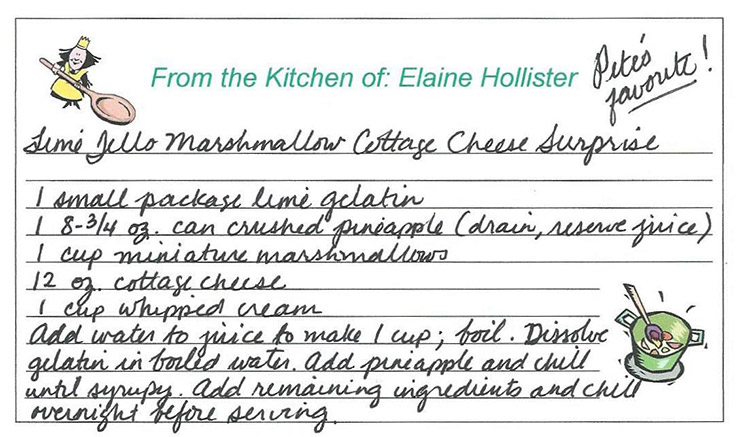
This is a game similar to “Simon Says” or “Mother May I?” One child stands at the finish line and acts as “it.” The remaining children line up at the starting line and advance toward the finish line by asking permission to move a certain number of steps. The child acting as “it” may allow or deny the movement, and if movement is made without permission the offending child moves back to the starting line. This may explain why the Hollister children were so well-behaved, since games of this type may have been created originally to reinforce proper manners.
When you don’t know (or can’t remember) what something is called, you simply call it a gizmo. Also known as a thingamajig, thingamabob, doohickey, or whatchamacallit.
A simple little interjection? Not really – it’s a euphemism for “God” dating back to the late 1700s. It was very popular in the 50s and 60s – remember Gomer Pyle?
When the Hollisters finish solving a mystery and wave farewell to their new friends, they say “good-by,” which might look odd to modern readers. That is simply an older variant spelling, and today we are more accustomed to seeing “good-bye” with a final e.
How many 12-year-old boys do you know who carry a hanky? Not many, we’ll bet, but you can be sure Pete Hollister always has a clean one at the ready to dab at his sisters’ tears or skinned knees.
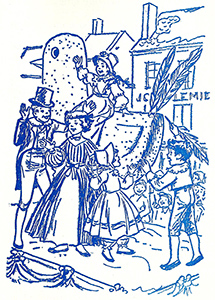 Birdwatchers in Shoreham are very familiar with the horned lark, which is very common in that part of the country. The song of a lark is very cheerful, so to be happy as larks are to be extremely happy. Unless, of course, you’re “Alouette,” the poor little lark of the song by the same name who gets all of her feathers plucked out! (See Ice Carnival, Ch. 18)
Birdwatchers in Shoreham are very familiar with the horned lark, which is very common in that part of the country. The song of a lark is very cheerful, so to be happy as larks are to be extremely happy. Unless, of course, you’re “Alouette,” the poor little lark of the song by the same name who gets all of her feathers plucked out! (See Ice Carnival, Ch. 18)
When mischievous Ricky Hollister is about to slide off a thatched roof, his brother Pete hastens to catch him. Pete saves the day with his quick thinking and even quicker action! Hasten rhymes with mason and means to hurry from one place to another.
Often spelled hocus-pocus, and used in magic tricks to announce a baffling trick, such as pulling a rabbit out of a hat. According to Wikipedia, the origins of this phrase are unclear. It may be based on the liturgical Latin phrase hoc est corpus meum meaning “this is my body.” It could be related to the name of a sorcerer in Norse folklore, Ochus Bochus, or simply a magician’s invented phrase, concocted to sound like flowery, mysterious Latin. In any case, anything hokus pokus sounds like a bit of a hoax.
When the Hollisters help catch a couple of crooks on a trip to Nevada, the local sheriff is grateful for the opportunity to take them straight to the hoosegow, or the jail. Hoosegow is a slang term for a jail or prison, primarily used in the American west, where cowboys originally came up with the term from the Mexican Spanish word for jail, “juzgao.”
When they arrived home, Pam was the first to enter the garage. What a hubbub was coming from Domingo’s stall!” A hubbub would be the noisy commotion that occurred when Ricky tried to paint spots on Domingo and ended up with a bucket of whitewash on his head instead. Mrs. Hollister is quite familiar with the ruckus and racket that five energetic and curious children can create, but she’s grateful that the hubbub at her house usually consists of peals of laughter or shouts of discovery.
Three cheers for hurrah, hurray, hoorah, hooray, huzzah, and rah rah! Zowie, there are a lot of different ways to show excitement!
See Beach buggy. A jalopy is a run-down or outdated motor vehicle.
Bonhomme Carnaval, the gigantic snowman who greets the Hollister family on their trip to a winter carnival in Quebec, wears a colorful sash and a jaunty red hat. Jaunty means lively or perky, and comes from the French word for noble or elegant, gentil.
Another exclamation of shock or surprise, and probably one of those handy minced oath euphemisms (see crickets). “Jeepers Creepers, Where’d You Get Those Peepers?” Thanks Harry Warren, Johnny Mercer, and Louis Armstrong!
Really fast.
Another good old-fashioned adjective in the dandy and swell group, another way to say something is really great or interesting.
Going on an overnight adventure? Don’t forget your knapsack. Precocious Sue Hollister might think that’s a fancy word for a sleeping bag, but a knapsack is a small backpack. Knapsacks are usually made of canvas or weatherproof fabric and have two straps for carrying over the shoulders.
People just don’t use poetic words anymore; this one means small hills, but it sounds much prettier.
Lapland is a region of northern Europe including parts of Norway, Sweden, Finland and the Kola Peninsula. The Lapps are the nomadic reindeer herders of the area, who now prefer to be called the Sami people. Andrew Svenson loved to travel, especially to exotic locations like Lapland, and often worked his destinations into stories to make them more educational.
In search of mystery and adventure in Puerto Rico, the Hollisters learn many Spanish words and phrases, like “hasta luego, lagarto” which means “see you later, alligator.” The word alligator comes from Spanish, el lagarto, or the lizard.
Donna Martin’s family had a laundress, a woman hired to wash and iron the family clothing and linens. Elaine Hollister was a stay-at-home mom extraordinaire who managed her time well enough to do her own cooking, cleaning, and laundering, with time left over for occasional mystery solving.
Oh, come on! Everybody knows what a lopadupalus is! If not, “you’ll know when you find one. It’s a first cousin to a thingamajig.”
On their way to Sea Gull Beach, the Hollisters stopped for hamburgers and milk at a luncheonette. Even though this roadside lunch spot was right next to a pony corral, it had a sparkling clean counter.
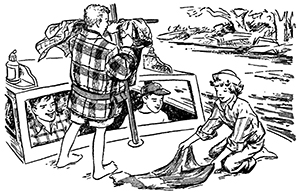 After a chilly water rescue, Pete dons a mackinaw belonging to Bill Barlow. This is a short coat made of water-repellent wool fabric called Mackinaw cloth that originated in the Mackinac or Mackinaw region of Michigan. Mackinaws are often red-and-black plaid, but of course in the new paperback version, it’s just plain old black and white.
After a chilly water rescue, Pete dons a mackinaw belonging to Bill Barlow. This is a short coat made of water-repellent wool fabric called Mackinaw cloth that originated in the Mackinac or Mackinaw region of Michigan. Mackinaws are often red-and-black plaid, but of course in the new paperback version, it’s just plain old black and white.
Who’s the most meaniest meanie you can think of? Joey Brill, of course!
These are small gas-powered carts operated on a track, usually seen in amusement parks. Andrew Svenson loved auto racing, and developed the plots and outlines for The Wynn and Lonny Racing Series by Eric Speed. His sons Andy, Jr., and Eric Svenson (Pete and Ricky) are remembered fondly by their families for their love of cars, especially fast ones. Even today the Svenson boys (and some of the girls) are into fast cars, motorcycles and racing. Andrew Svenson would be thrilled to know that two of his grandsons are currently active in the auto racing business.
Zowie, this is really interesting! At first we thought this just meant a small toy fire engine. But it turns out there was actually a company that manufactured small die-cast toys, called Midgetoys. http://www.mrrc.info/MIDGETOY/Midgetoy/History.html If you want to buy one just like the one Ricky and Uncle Russ bought for their treasure hunt, you can get one on eBay! http://www.ebay.com/sch/i.html?_odkw=midget+toys&_sop=12&_osacat=0&_from=R40&_trksid=p2045573.m570.l1313.TR10.TRC1.A0.H0.Xmidgetoy+firetruck&_nkw=midgetoy+firetruck&_sacat=0
This is an idiom used to express surprise that something unexpected has occurred or turned out to be true. The State of Tennessee v. Scopes (the Scopes Monkey Trial, 1925) was still fairly fresh in people’s minds in the 1950s, so this phrase was much more common then than now.
To figure out if a prowler’s dropped glue stick was the same one used to seal a threatening note, Holly isn’t afraid to taste both the glue stick and the letter to see if they taste the same! By licking the mucilage, or the adhesive glue that holds the letter together, she’s able to determine that the same glue stick was used to seal the mysterious letter.
A newspaper delivery route was a rite of passage and often the first “real” job for boys in the 1950s. Up before the crack of dawn to fold and deliver the papers, sometimes out again in the afternoon to deliver the evening news, and then out again to collect payments, it was a big responsibility. Even Will Wilson took his route very seriously.
Once upon a time “nifty” meant stylish or clever, but in the Happy Hollisters it could probably be substituted for “swell.” It may have started out as a shortened form of “magnificent.” It’s still a pretty nifty little word.
Numismatics is a fancy word for the study of coins and related items used in payment for goods and services. Mr. Steinberg is a numismatist who owns the coin shop in Shoreham and teaches the Happy Hollisters about the hobby of coin collecting.
While looking for clues, the Hollisters sometimes find items that turn out to be regular trash, like a pasteboard box. A pasteboard box is very similar to a cardboard box, except that a pasteboard box is constructed of sheets of heavy paper glued together, while cardboard is typically made of corrugated sheets of wood-based material.
A door-to-door salesman. Back in the 1950s there were a lot of people who went around neighborhoods selling things: books, vacuum cleaners, brushes, even food. Today’s young readers may be surprised at the ease with which Holly talks to a stranger at their doorstep, and how Mrs. Hollister buys strawberries from him without any hesitation. People were much more trusting back then!
Pam runs pell-mell, trying to catch the dog that has run off with her string of frankfurters. That is to say, she runs frantically after him. Such action is generally ill-advised, but it’s better than the dog running pell-mell after her. That doesn’t happen until the next page.
Periwinkle is a small flower, a light blue color, and, as we learn on a visit to Sea Gull Beach, it’s also a small, edible sea snail. Yum-o!
A phonograph is an electrical device that produces sound by means of a needle being rotated against a flat vinyl disk. This disk or “record” is 10-12” in diameter, embossed with grooves in which the needle tracks from the outside to the center, producing the recorded sound. This may be hard to imagine if the only music you have ever heard has come from an iPod.
Some folks say “piggy-back” but with a Shoreham accent it’s pronounced pickaback.
When you’ve got seven mouths to feed on a picnic, you need a really big basket for all that food – pack up the picnic hamper!
If you’ve watched Little House on the Prairie or visited Colonial Williamsburg, you’ve seen ladies wearing one of these – a hat with a protruding brim in front, designed to shade a lady’s face from the sun or perhaps from the unwanted gaze of a man. It was also large enough in the back so that all the hair could be “poked” inside, and usually had a cloth strip or ribbon to tie underneath the chin – which would be helpful if you expect a cat to walk in a parade wearing a hat.
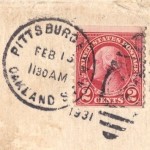 Way back in the old days before email and Twitter and Instagram, people used to correspond with one another by writing letters. With ink pens. On paper. Then they bought a stamp from the post office, wrote the address on an envelope, put the stamp on the envelope, and took the letter to the post office. The post office put a “postmark” on the letter showing when it was mailed. And some people think life was simpler back then!
Way back in the old days before email and Twitter and Instagram, people used to correspond with one another by writing letters. With ink pens. On paper. Then they bought a stamp from the post office, wrote the address on an envelope, put the stamp on the envelope, and took the letter to the post office. The post office put a “postmark” on the letter showing when it was mailed. And some people think life was simpler back then!
In The Happy Hollisters, prankster is pretty much synonymous for Joey Brill or Will Wilson – someone who is always playing tricks on people!
This is just another name for a police or squad car, but calling it a prowl car makes it sound so much more furtive and mysterious!
Crooks who write bad checks might use fake names or aliases, but writers of children’s books sometimes use pseudonyms, or pen names. Happy Hollisters author “Jerry West” was actually Andrew Svenson, who also wrote about 20 Hardy Boys books as “Franklin W. Dixon” and several Bobbsey Twins books as “Laura Lee Hope.” These alternate names were created so that more than one author might contribute to a series of books.
Something that is queer is very odd or unusual, and may come from the German word quer, which means slanting or oblique.
Even though the Hollisters know that Lucky the lizard, who they find in a crate of pineapples, will be happier in his new life in Puerto Rico, Sue is so sad to see him get released that her voice beings to quaver. Typically associated with emotion or nervousness, a quaver is when someone’s voice shakes or trembles.
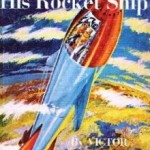 Pete uses this expression to show his excitement at finding an amazing clue. We haven’t found any other literary uses of this term, but can’t help but wonder if its origin might be in the Tom Swift, Jr., series. This was another book series which was developed by the Stratemeyer Syndicate during the years when Andrew Svenson was active as a writer and partner in the Syndicate.
Pete uses this expression to show his excitement at finding an amazing clue. We haven’t found any other literary uses of this term, but can’t help but wonder if its origin might be in the Tom Swift, Jr., series. This was another book series which was developed by the Stratemeyer Syndicate during the years when Andrew Svenson was active as a writer and partner in the Syndicate.
Sue Hollister’s little friend Stevie is roly-poly, which sounds a little pudgy, but “roly-poly” is much more fun to say!
We don’t mind a little rain, since April showers bring May flowers. As April comes to an end, the heavy rain turns into a fine “Scotch mist” — a light drizzle.
This word is often confused with “shimmy.” Ricky climbed the merry-go-round pole by shinnying, which means he gripped the pole with his hands and legs and pulled himself up. If Ricky was “shimmying” he would have been doing a 1920s dance move characterized by rapid shaking. And his merry-go-round ride really would have been quite a sight to see!
Mr. Sparr, the Hollisters’ old sailor friend is known for his funny stories, his ship models, and his spectacles, which he wears while helping the children examine a drawing of an old clipper ship. Spectacles are an old-fashioned term for glasses.
If you look closely at the illustrations, it appears that the Hollister family drove a wood-paneled station wagon, sometimes called a “woodie.” In 1953 that was a mighty keen car, one that every large suburban family would have coveted. The station wagon was the forerunner of the SUV: a car with a third seat or a large storage area in the back. The rear door, also called the tailboard or tailgate, folded down – why do you think it’s called a “tailgate” party at a sporting event?
On the Happy Hollisters’ flight to New Mexico, their every need was attended to by Miss Traver and Miss Gilpin, the air hostesses or stewardesses. In later years, men occasionally took up the job as “stewards,” but nowadays most people just call them “flight attendants.”
Mrs. Hollister probably did most of her shopping at small family-owned markets or individual shops, like the butcher, the baker, and the candlestick-maker. So when Pam suggested a family trip to the big super-market to stock up on provisions, it was a more unusual event and fun for the whole family – who doesn’t like grocery shopping with five kids in tow?
If one adjective is most often associated with the Hollisters, it would be “swell,” a most excellent, wonderful, and wholesomely awesome word.
Supper? Or Dinner? Depending on where you live, you might use either of these words to mean the meal you eat in the evening, or dinner might be the noon meal. In our house, we had supper on weeknights and dinner at noon on Sundays. Or if company was coming, we’d have them over for dinner; it generally meant a fancier meal.
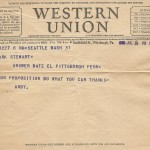 Long before long-distance calling became affordable, telegrams were a popular means of communicating written messages over long distances. In fact, tele means distance, and graph means writing. Telegraph operators sent and received messages using Morse code (how fitting for a family who loved using codes) and the messages were printed out and delivered to the recipient. They were especially popular for short business messages, as shown in this 1930 telegram sent by Andrew Svenson to his father-in-law, Frank Stewart.
Long before long-distance calling became affordable, telegrams were a popular means of communicating written messages over long distances. In fact, tele means distance, and graph means writing. Telegraph operators sent and received messages using Morse code (how fitting for a family who loved using codes) and the messages were printed out and delivered to the recipient. They were especially popular for short business messages, as shown in this 1930 telegram sent by Andrew Svenson to his father-in-law, Frank Stewart.
When Mr. Hollister “flung himself up onto his steed as if he were a Texas Ranger,” you may have pictured a baseball player jumping on a horse and didn’t think that made much sense. And it doesn’t really: the baseball team didn’t even exist until 1972 (although I’m sure there are some baseball players that are also fine horsemen). The reference makes a lot more sense if you know about the Texas Rangers, the oldest group of law enforcement officers in the United States. Picture mounted police with cowboy hats and spurs. There were Rangers even before Texas became Texas, and if you picture Mr. Hollister as one of those, you could probably imagine a very distinguished horseman, even on a carousel horse. http://www.texasrangers.org/The%20Rangers.asp
Polite youngsters like the Happy Hollisters say “thank you, ma’am” to show gratitude to an older woman, but in parts of the Northeast, this phrase refers to a bump or dip in the road! This fun expression comes from the way driving over a bump in the road causes a car’s passengers to nod their heads, much in the way someone might when saying “thank you.”
Travelers these days are familiar with hotels and motels: a hotel usually has a lobby and interior rooms; at a motel you drive right up and park in front of your room’s door. A tourist camp is much more quaint version of a motel, usually in the middle of nowhere, and each guest/family has their own little house or cottage.
When Ricky takes a tumble while playing around on the swing set, he ends up with muddy water all over his trousers! Trousers is another word for a tailored pair of pants. Trousers may include belt loops and a waistband, like jeans or slacks do, but are considered slightly dressier since they are tailored, or fitted and well-cut.
At a good old-fashioned ice cream parlor, this would be ice cream flavored with chopped nuts and candied fruits – fruitcake without the cake. And it makes a perfect name for a cat with mixed colors – but if Tutti-frutti was a calico, why didn’t they just name it Callie, a beautiful name (see calliope) which incidentally was also Frank Hardy’s girlfriend’s name.
When the Hollister children visit the Shoreham newspaper office in their hunt for “Old Moe,” they have the opportunity to see a newspaper being printed on a type-setting machine. Nowadays, with newspapers produced digitally, it’s hard to imagine the laborious process that was undertaken back then, each and every day, to produce a newspaper. We were fascinated with this YouTube video that shows the complete process as it would have been in the Hollisters’ day. The headline story is similar to The Happy Hollisters on a River Trip – and if you listen carefully, you’ll hear another “Hollisterism” in the dialogue! https://www.youtube.com/watch?v=KSr3bb-B7Jk
When Ricky tries to paint Domingo the burro with spots to make him look like an Appaloosa horse, he ends up covered in spots himself when Domingo spooks and kicks over the bucket of whitewash. Whitewash is a type of painting medium that is made by mixing lime and water, which gives a white color when painted on walls, furniture, or donkeys!
The Happy Hollisters go on a lot of wild goose chases throughout the series – pursuing clues that lead nowhere or simply don’t pan out. The historical origin of this phrase is very interesting: “Englishmen in the late 16th century invented a new kind of horse race called the wild-goose chase in which the lead horse could go off in any direction and the succeeding horses had to follow accurately the course of the leader at precise intervals, like wild geese following the leader in formation. At first the phrase ‘wild-goose chase’ figuratively meant an erratic course taken by one person and followed by another; Shakespeare used it in this sense. But later the common term’s origins were forgotten and a ‘wild-goose chase’ came to mean ‘a pursuit of anything as unlikely to be caught as a wild goose,’ any foolish, fruitless, or hopeless quest.” From the “Encyclopedia of Word and Phrase Origins” by Robert Hendrickson (Facts on File, New York, 1997).
An all-purpose exclamation of surprise or excitement, and a favorite expression of all the Hollisters.
Those Hollisters sure were an excitable bunch! This is another exclamation similar to “wow!” used to show surprise or delight.
